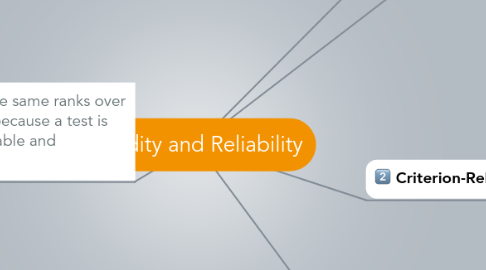
1. Reliability - the consistency to yield the same ranks over repeated administrations. Important because a test is only useful if its results are reliable, stable and dependable.
2. Inspection of test questions to determine if they correspond to what the user decides should be covered by the test
2.1. Identify Project Resources
2.2. Recruit Project Steering Committee
2.3. Recruit Project Coordinators
2.4. Identify / Recruit Key Stakeholders
2.5. Determine Training Requirements
2.6. Map the Project Organization Chart
2.7. Review Project Organization
3. Content Validity
3.1. Easy to determine in area of ahievement
3.1.1. Establish Project Objective
3.1.2. Establish Project Scope
3.1.3. Map Requirements
3.1.4. Map Solution
3.1.5. Map Training Requirement
3.1.6. Review Project Scope
3.2. Difficult to determine in areas of personality or aptitude
3.2.1. Determine Project Approach, Stages and Steps
3.2.2. Estimate Project Duration
3.2.3. Establish Resource Requirements
3.2.4. Prepare Project Schedule and Budget
3.2.5. Prepare Work breakdown structure
3.2.6. Document Success Criteria
3.2.7. Review Project Schedule
3.3. Important because it determines if the test matches the instructional objectives
3.3.1. Establish Project Administration Procedures
3.3.2. Establish Quality Control Procedures
3.3.3. Establish Progress Control Procedures
3.3.4. Establish Change Control Procedures
3.3.5. Establish Issue Resolution Procedure
3.3.6. Review Project Control Procedures
3.4. Measures how well content taught has been mastered
3.4.1. Estimate Project Costs
3.4.2. Identify and Quantify Benefits
3.4.3. Determine Break-even Point
3.4.4. Analyze Risk
3.4.5. Review Business Case
4. Criterion-Related Validity
4.1. Scores are correlated with external criterion
4.1.1. Establish checkpoints
4.1.2. Acquire team resources for stage
4.1.3. Conduct stage kick-off meeting
4.2. Concurrent - measures how well a new test correlates with an already established measured test
4.2.1. Determine Frequency of Meetings
4.2.2. Schedule Meetings
4.2.3. Brief Project Board
4.2.4. Prepare Meetings
4.2.5. Conduct Meetings
4.2.6. Follow-up Meeting
4.3. Concurrent - important because it can be given to a group of students, faster to administer and less expensive
4.3.1. Schedule Quality Review Meeting
4.3.2. Prepare for Quality Review Meeting
4.3.3. Conduct Quality Review Meeting
4.3.4. Follow-up Quality Review Meeting
4.4. Predictive - determines a future behavior
4.4.1. Update Project Schedule
4.4.2. Update Budget / Costs
4.4.3. Conduct Team Status Review
4.4.4. Create Status Report
4.5. Predictive - important because it can gauge future college success or any other desired predictive outcome
4.5.1. Request Changes
4.5.2. Identify Alternative Solutions
4.5.3. Conduct Steering Committee Meeting
4.5.4. Document Change Responses
4.5.5. Implement Change(s)
4.6. Yields a numeric value
4.6.1. Identify Project Issues
4.6.2. Assess Impact of Issues
4.6.3. Assign Resources
4.6.4. Resolve Issue
5. Construct Validity
5.1. Determines relationship to other information and how it corresponds well with some theory
5.1.1. Prepare Product Evaluation
5.1.2. Conduct Product Evaluation
5.1.3. Initiate Maintenance Process
5.2. Logical explanation that can account for the interrelationships among a set of variables
5.2.1. Prepare for Project Closure Meeting
5.2.2. Conduct Project Closure Meeting
5.2.3. Follow Up Project Closure Meeting
